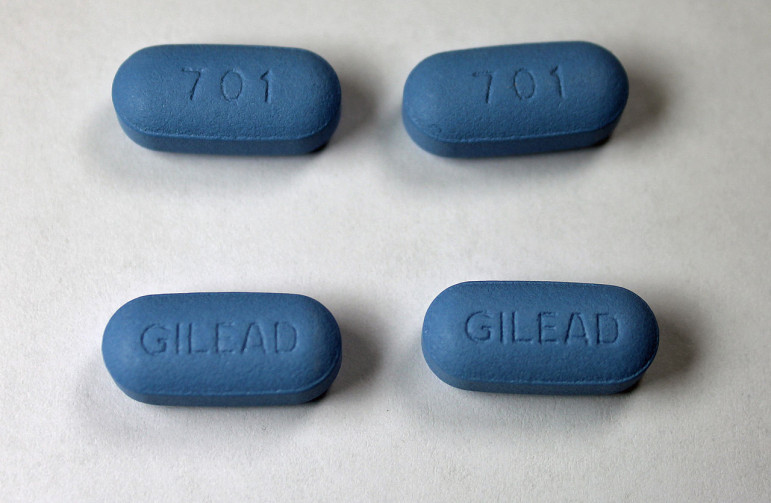‘At Alliance and community health centers across New York, we use these savings to fund otherwise uncompensated care, ensuring that low-income New Yorkers have consistent access to life-saving medications and treatment adherence support.’

Jeffrey Beall
Truvada pills. They are one of several medications that are commonly part of anti-retroviral therapy that can prevent HIV from becoming AIDS.Three decades ago, at the height of the HIV/AIDS epidemic, my organization Alliance for Positive Change opened its doors to offer much-needed connections to medical care, harm reduction, peer support, and housing assistance. We are once again in a frontline position, providing underserved New Yorkers living with HIV, hepatitis C, substance use issues, and other chronic conditions with consistent care and support amid COVID-19.
Safety-net health providers like Alliance address longstanding health-equity disparities by connecting New Yorkers—including people of color, immigrants, and members of the LGBTQ+ community—to quality health care. Community health providers have played a crucial role in the fight against COVID-19, caring for those who have been disproportionately impacted by the pandemic and working to provide equitable access to vaccines.
Yet, as we deal with the most significant public health crisis in the last 100 years, New York State is forging ahead with a policy that would disrupt care for vulnerable New Yorkers on Medicaid and threaten the financial stability of safety-net providers.
The Department of Health has proposed a change to Medicaid that would “carve-out” the pharmacy benefit from Medicaid managed care plans and move it under a one-size-fits-all bureaucracy, managed by the state. For the people we serve in New York City with HIV/AIDS and other chronic health conditions, this would disrupt care by having their pharmacy benefit—a crucial component of health care for people living with chronic conditions—managed by a new, larger, difficult-to-navigate entity. It would immediately become challenging for them to access life-saving medications in a timely manner.
For safety-net providers like Alliance, the results would be catastrophic. We would no longer be eligible to reinvest savings from the federal drug discount program commonly known as 340B, eliminating our ability to continue to offer critical services including COVID-19 vaccination, low-cost medications for HIV, food and nutrition programs, patient transportation, and other supportive services. Instead, the state would be taking this revenue directly.
 CityViews are readers’ opinions, not those of City Limits. Add your voice today!
CityViews are readers’ opinions, not those of City Limits. Add your voice today!
At Alliance and community health centers across New York, we use these savings to fund otherwise uncompensated care, ensuring that low-income New Yorkers have consistent access to life-saving medications and treatment adherence support. One New Yorker on Medicaid, Ismael, has been receiving services at Alliance since 2006. We helped him secure medication and connected him to mental health support. Ismael is now paying it forward as a member of Alliance’s pharmacy access team, helping others adhere to treatment.
The carve-out would cost providers across New York State an estimated $250 million annually. Safety net providers would be forced to lay off frontline staff and cut services to the most vulnerable New Yorkers.
The state justifies the carve-out based on the belief that their bargaining power, negotiating on behalf of millions of Medicaid members, can lower prescription costs and get a higher drug rebate rate from manufacturers. But a recently released report examining the impact of implementing the pharmacy carve-out in New York suggests this isn’t true. In fact, the report suggests that the carve-out is highly likely to result in increases in Medicaid costs, estimating that the switch would cost New York State $195 million during the first year of implementation and $1.9 billion during the first five years.
The arguments supporting the carve-out simply don’t add up. This policy change will cause disruption for vulnerable New Yorkers and jeopardize the financial health of community-based providers. We applaud the New York State Senate and Assembly for rejecting the 340B carve-out in their one-house budget bills, and we urge lawmakers to ensure the rejection is included in the final New York State budget on April 1. Join me in calling on Governor Cuomo to repeal the Medicaid pharmacy carve-out at (518) 474-8390. Reversing the carve-out gives us time to figure out a solution that lowers prescription costs without dealing a devastating blow to providers and the New Yorkers we serve.
Alliance for Positive Change and other safety-net health care providers have spent decades addressing HIV/AIDS, hepatitis, and other chronic illnesses in New York State. We have made great strides to ensure that all New Yorkers have the opportunity to live full, healthy, productive lives. The pandemic laid bare for all to see the devastating health inequalities that we deal with on a daily basis, and we should be investing to address these inequalities. Now is not the time to destroy the health care safety net for New Yorkers who rely on their community providers.
Sharen I. Duke is the executive director and CEO of Alliance for Positive Change








